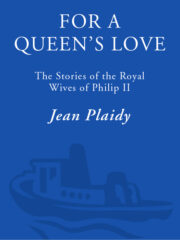Eleonore had been at today’s tourney and she would have witnessed his humiliation. It was always to women that Philip turned for compassion—to Leonor, to Maria Manoela, to Isabel, and now … perhaps to Eleonore.
She knelt before him.
“Have I your Highness’s permission to speak frankly?”
“You have, dear Aunt.”
He would have liked to embrace her, but he could not bring himself to do so. He could only sit straight in his chair, bid her rise, bid her be seated; and even while he longed for her compassion he could not behave otherwise than as the Prince of Spain.
“I wish to speak to you of my daughter.”
“The Princess of Portugal,” said Philip; and he felt excited, for Eleonore’s daughter was the aunt of Maria Manoela.
“She is a charming girl,” went on Eleonore, “and I am sure you would love her. She has already heard of you and talks of nothing else, so I hear. There would be a good dowry with her, and I doubt not that if you approved the match, the Emperor would also.”
“Maria …” He spoke the name so quietly that she scarcely heard. He was living it all again, seeing her ride into Spain with her Castilian cape about her shoulders, raising her frightened eyes to his—Maria Manoela who had gone and in her place had left him Carlos.
He rose and walked about the room, for he did not want his aunt to see his emotion. At length he stopped and looked at her.
“Have you spoken of the marriage to the Emperor?”
“No, your Highness; but I doubt not its possibilities have occurred to him.”
“I will consider them,” he said; and he bowed his head in a manner which told her the interview was at an end. She accepted dismissal and left him alone with his thoughts.
It seemed to Philip that life was ironical. He was required to have a wife; and he would, of course. When had he ever failed to do what was expected of him? It was almost as though he had reverted to his youth when his father had said to him: “Jeanne of Navarre is divorced from that fool of Clèves. What think you of taking her for a wife?”
He had thought of it. He remembered afresh his feelings for her. He recalled how she had gone to the Cathedral to present her protests to the bishops, how she had defied her mother and King Francis. At that time he had delighted in her bravery; now he saw her conduct in a different light. Such a flouter of authority was not a fit wife for him.
His Uncle Ferdinand was impressing on the Emperor that his, Ferdinand’s, daughter would make a suitable Queen of Spain. Ferdinand would be ready to make concessions regarding this complicated matter of settling the inheritance if, now that his son had married the Emperor’s daughter, the Emperor’s son Philip married his daughter.
Philip wanted neither Ferdinand’s daughter nor Jeanne of Navarre. Maria of Portugal roused memories, but he longed for the peace of Isabel’s home and his own children playing at his feet.
His thoughts were uneasy. He knew that soon he must take a wife, and he wanted none of them—not Maria who might bring too poignant memories of Maria Manoela, not Jeanne of Navarre, that strong-willed young woman, nor Ferdinand’s daughter, a union with whom would make the settlement so much easier. He wanted none of these women; he wanted only Isabel, whom he thought of as his wife.
He was melancholy, longing for home.
But, being Philip, he did his duty. He tilted in the tourneys; he accepted the prize as victor, although he disliked doing so, knowing that his victory had been arranged. The spectators knew it too; he was aware of their cynical glances.


"For a Queen’s Love: The Stories of the Royal Wives of Philip II" отзывы
Отзывы читателей о книге "For a Queen’s Love: The Stories of the Royal Wives of Philip II". Читайте комментарии и мнения людей о произведении.
Понравилась книга? Поделитесь впечатлениями - оставьте Ваш отзыв и расскажите о книге "For a Queen’s Love: The Stories of the Royal Wives of Philip II" друзьям в соцсетях.